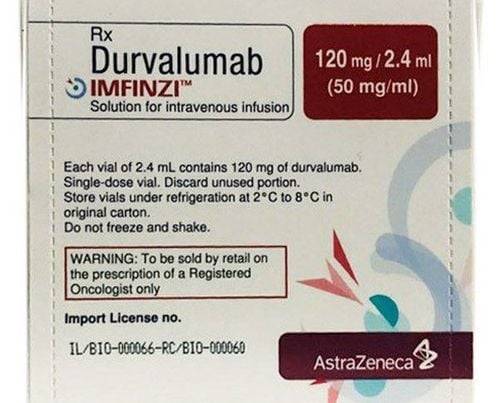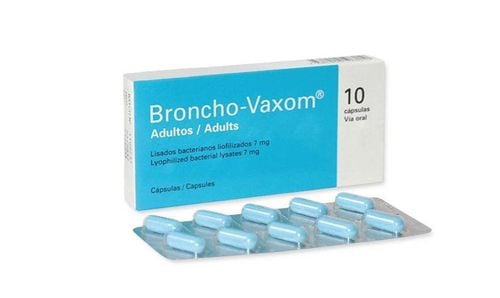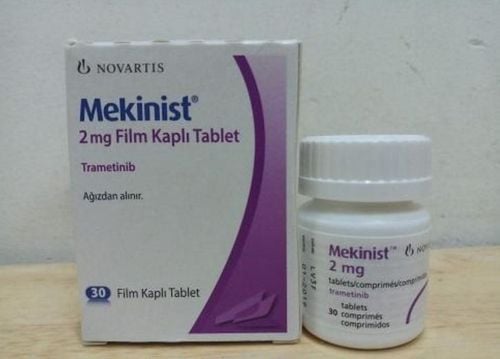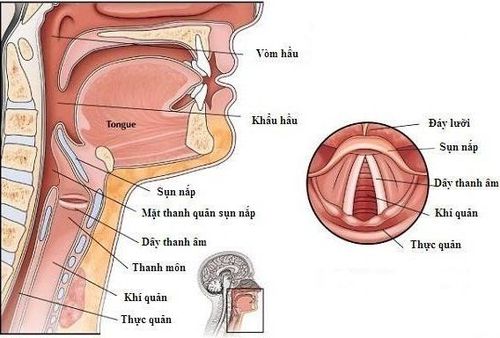This is an automatically translated article.
The article was professionally consulted by Doctor Emergency Department - Vinmec Hai Phong International General Hospital.
Prolonged cough is a very common symptom, especially in the days when the weather changes seasons, affecting activities, sleep and often causing fatigue. More severe cases can lead to vomiting, dizziness, depression... Coughs only go away when the underlying cause is treated.
1. Symptoms associated with a persistent cough
The patient has a dry cough or a cough with sputum, prolonged, runny or stuffy nose, feeling that there is nasal secretions running down the back of the throat. Patients frequently want to clear their throat or have a sore throat. Hoarseness, wheezing or difficulty breathing. There may be heartburn or a sour taste in the mouth. In rare cases, coughing up blood may occur.
2. What causes a persistent cough?

Cigarette smoking, pipe tobacco is the most common cause of long-lasting cough that doesn't go away. Non-smokers who are regularly exposed to secondhand smoke can also lead to coughing and lung damage. Gastric juice reflux into the esophagus, relatively common, gastric juice back up into the esophagus, causing constant irritation leading to prolonged cough, using cough medicine still does not reduce. Rhinitis: caused by an overproduction of mucus in the nose or sinuses, which runs down the back of the throat and irritates the cough reflex. Asthma: A cough associated with bronchial asthma usually occurs seasonally or after an upper respiratory tract infection or is aggravated by exposure to cold air, certain chemicals, or irritants. Chronic Bronchitis: Chronic bronchitis causes congestion, shortness of breath, wheezing, and cough with phlegm. Most people with chronic bronchitis have a history of smoking or are current smokers. Bacterial infections: Coughs often last longer after the symptoms of the flu, pneumonia, or upper respiratory tract infection have cleared up. Using certain drugs such as: antihypertensive drugs, especially angiotensin-converting enzyme inhibitors, often cause a persistent dry cough, which will go away after stopping the drug. Prolonged cough is also caused by: bronchiectasis, chronic obstructive pulmonary disease (COPD), eosinophilic pneumonia, cystic fibrosis, lung cancer, sarcoid disease. Older adults and women tend to be more sensitive to the cough reflex.
3. What should I do if I take a long-term cough that doesn't go away?
Identifying the cause of the cough is the key to effective treatment for a persistent cough. It is advisable to examine whether more than one medical condition causes persistent cough in the same patient. In some cases, stopping certain medications, such as ACE inhibitors, can help clear up a cough. Instead of using cough medicine, it is advisable to redirect the treatment of gastroesophageal problems in reflux disease, the cough will disappear automatically after that. Medicines often used by doctors for persistent coughs include:
Antihistamines and decongestants (when there is an irritating cough and postnasal drip). Asthma inhaler (most effective in cough-type asthma because it reduces inflammation and dilates the airways) Antibiotics if the cough is caused by an infection Drugs that inhibit gastric secretion if acid reflux occurs - oesophagus Cough reliever if the cause cannot be determined, especially a cough that interferes with sleep Sputum thinners help to easily expel sputum through the cough reflex Rinse nose and throat with sea salt Nebulizer at topical with antibiotics, anti-inflammatory depending on the manifestation and cause.

4. Note when using cough medicine
Medicines to thin sputum and dissolve sputum should not be used in the evening because when sleeping, the activity of the villi in the bronchial mucosa will decrease, which easily causes sputum stagnation in the lungs.
Cough medicine is only used for dry cough, not for cough with phlegm and symptoms of respiratory failure. The lowest effective dose should be used and used for as short a time as possible to limit the side effects of the drug.
Cough medicine has the effect of reducing cough, only used in case of dry cough, irritation causing discomfort. In case of cough with phlegm, the doctor will prescribe medicine to thin or dissolve phlegm. Do not use cough medicine combined with expectorants because the sputum will be more secreted, but the cough reflex is also reduced, making the patient unable to cough up.
5. Prevention of recurrent cough
Avoid allergens or irritants, sudden temperature changes (in and out of air-conditioned rooms): dust inside and outside the house, pets in the house, moldy air, keeping the neck and face warm in the cold season, do not eat, drink stimulants such as too spicy, too hot,... Do not smoke and avoid secondhand smoke (which is the most common cause of chronic bronchitis) because smoke irritates the respiratory tract, lungs and can worsen coughs from other causes. Reduce gastro-oesophageal reflux: in addition to using drugs, lifestyle changes such as eating many small meals, not lying down after eating for at least 2-3 hours, raising pillows when sleeping, limiting foods, sour, spicy, gas-rich drinks... also have a significant effect. Exercise and implement a balanced diet, improve physical condition, limit emotions, increase resistance to pathogens such as bacteria and viruses. Get a flu shot, pneumonia, or upper respiratory infection vaccine as directed by your doctor.
Please dial HOTLINE for more information or register for an appointment HERE. Download MyVinmec app to make appointments faster and to manage your bookings easily.













